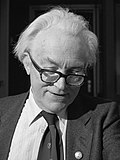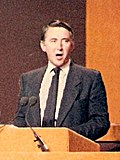5 May 1983 | |||||||||||||||||||||||||||||||||
All 36 metropolitan boroughs, all 296 English districts and all 37 Welsh districts | |||||||||||||||||||||||||||||||||
|---|---|---|---|---|---|---|---|---|---|---|---|---|---|---|---|---|---|---|---|---|---|---|---|---|---|---|---|---|---|---|---|---|---|
| |||||||||||||||||||||||||||||||||
Local elections were held in the United Kingdom on 5 May 1983. [1] [2] The results were a success for Conservative Prime Minister Margaret Thatcher, who soon afterwards called a general election in which the Conservatives won a landslide victory. The projected share of the vote was Conservative 39%, Labour Party 36%, Liberal-SDP Alliance 20%.
Contents
The three major parties all made net gains at the expense of smaller parties and independents, despite a slight reduction in the number of councillors. The Conservatives gained 110 seats, giving them 10,557 councillors. Labour gained just 8 seats, finishing with 8,782 seats. The Liberal-SDP Alliance gained 321 seats, finishing with 2,171 seats. It was a decent showing for Labour, with a much larger share of the vote than any opinion poll had shown since the party's split in 1981, but a major disappointment for the Alliance. However, the subsequent general election saw the Conservative government elected by a landslide, while the Alliance came close to Labour in terms of votes, although Labour won almost 10 times as many seats.



